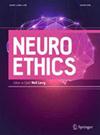再次重温马赫的单因素妄想理论
IF 3.8
4区 哲学
Q1 ETHICS
引用次数: 0
摘要
聂辰席([22])反对用马赫的单因素方法来解释妄想。我们认为他的反对是失败的。这些反对意见主要是基于对这一方法的错误理解(即认为异常经验足以导致妄想)。如果不是基于这种理解,则是基于对最近对这一立场的辩护的误读,以及对单因素理论可用资源的低估。本文章由计算机程序翻译,如有差异,请以英文原文为准。
Revisiting Maher’s One-Factor Theory of Delusion, Again
Chenwei Nie ([22]) argues against a Maherian one-factor approach to explaining delusion. We argue that his objections fail. They are largely based on a mistaken understanding of the approach (as committed to the claim that anomalous experience is sufficient for delusion). Where they are not so based, they instead rest on misinterpretation of recent defences of the position, and an underestimation of the resources available to the one-factor theory.
求助全文
通过发布文献求助,成功后即可免费获取论文全文。
去求助
来源期刊

Neuroethics
MEDICAL ETHICS-
CiteScore
5.50
自引率
7.10%
发文量
31
审稿时长
>12 weeks
期刊介绍:
Neuroethics is an international, peer-reviewed journal dedicated to academic articles on the ethical, legal, political, social and philosophical questions provoked by research in the contemporary sciences of the mind and brain; especially, but not only, neuroscience, psychiatry and psychology. The journal publishes articles on questions raised by the sciences of the brain and mind, and on the ways in which the sciences of the brain and mind illuminate longstanding debates in ethics and philosophy.
 求助内容:
求助内容: 应助结果提醒方式:
应助结果提醒方式:


